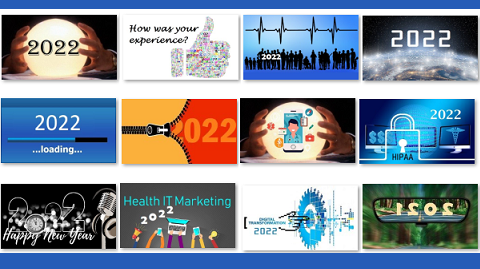We are continuing our monthly “Sorting out AI, ML, DL, and NLP” report with a new look for 2022. Each month we will bring you the news highlights focused on AI in healthcare.
According to ReportLinker, the artificial intelligence in healthcare market is projected to grow from USD 6.9 billion in 2021 to USD 67.4 billion by 2027; it is expected to grow at a CAGR of 46.2% from 2021 to 2027. This should supply plenty of news to report in the coming year.
But to start we thought we would look back at highlights of 2021.
AI in Healthcare News Highlights from 2021
- Microsoft’s $19.7 billion acquisition of Nuance which augments the Microsoft Cloud for Healthcare with Nuance’s AI solutions.
- Alphabet launches Isomorphic Labs, an AI-driven drug discovery startup. The new venture plans to partner with biomedical and pharmaceutical companies, using artificial intelligence to discover new medicinal advancements.
- French AI biotech startup Owkin gets investment from pharma giant Sanofi and boosts Owkin into the unicorn club with over $1 billion valuation.
- US FDA, Health Canada, and the United Kingdom’s MHRA jointly identified 10 guiding principles that can inform the development of Good Machine Learning Practice (GMLP).
- IBM’s unsuccessful attempt at selling its IBM Watson Health appears to be back on the market.
- Mount Sinai launches Department of Artificial Intelligence and Human Health. New department is the first of its kind at a U.S. medical school.
- Covid-19 pandemic accelerated AI-related deal activity in the pharma sector
- AI enables individual elements of anatomy are identified and tracked independently in surgical robotics technology.
- World Helath Organization (WHO) warns that AI technologies come with a risk in their report, Ethics and governance of artificial intelligence for health, published in June 2021.
- Mayo clinic signs multi-year research collaboration agreement with Pro Medicus Limited for leveraging of the Visage AI Accelerator platform.
- FDA AI Tool is advancing Health Care, the tool shows promise in increasing success rates of detecting cancer, and a new data strategy shows promise for future medical devices.
AI in Healthcare Good Reads
Can AI Reinvent Radiation Therapy for Cancer Patients? – By John Halamka and Paul Cerrato – Of all the advances in health care artificial intelligence (AI), medical imaging is probably the most remarkable success story. Two prominent examples come to mind: Machine learning has helped improve the screening and diagnosis of retinal disease and is making inroads in skin cancer detection. Given these developments, it’s not surprising to find researchers and clinicians developing the digital tools to improve radiotherapy, which combines imaging technology with high doses of ionizing radiation, delivered through a device called a linear accelerator.
Can regulators keep up with AI in healthcare? by Abi Millar, Medical Device Network. As more AI-driven healthcare products are brought to market, how can regulators keep pace with this rapidly evolving technology? Artificial intelligence (AI) is becoming a force to be reckoned with in healthcare. Over the last decade or so, AI-based healthcare products have moved out of the proof-of-concept stage and have begun to rewrite our understanding of what might be possible.
Lessons Learned from the CMS Artificial Intelligence Health Outcomes Challenge – By Elizabeth Fowler, Ph.D., J.D., Deputy Administrator and Director of CMS’s Center for Medicare and Medicaid Innovation, and James Gerber, J.D., M.B.A., Director, Division of Portfolio Management and Strategy, CMS Innovation Center (@CMSGov) – On April 30, CMS announced the winner and runner-up of the CMS Artificial Intelligence (AI) Health Outcomes Challenge (AI Challenge), a prize competition for innovators to demonstrate how artificial intelligence tools can be used to accelerate the development of AI solutions that predict patient health events for Medicare beneficiaries for potential use by the CMS Center for Medicare and Medicaid Innovation (Innovation Center) in testing innovative payment and service delivery models. This announcement, which marked the culmination of a two-year competition, was an exciting example of how public/private partnerships can drive innovation. The AI challenge was notable for several reasons…
FDA Review Can Limit Bias Risks in Medical Devices Using Artificial Intelligence – By Liz Richardson, The PEW Charitable Trusts (@pewtrusts) – Artificial intelligence (AI)—broadly defined as the science of developing machines that can simulate human thinking—offers great potential to improve health care and reduce costs. For example, medical professionals and health care systems are starting to use AI to facilitate faster diagnoses, predict the likelihood of a particular patient outcome, and help conduct research on new treatments. But like any medical product, these software tools can also pose risks. The algorithms that underpin AI software may have hidden biases that lead to disparate outcomes for different patient groups, potentially reinforcing long-standing inequities.
Healthcare AI Top Lists
Who doesn’t like a good list? Here are some I thought good enough to share.
- The 10 Most Revolutionary AI Companies in Healthcare 2021
- The biggest healthcare technology trends in 2021
- Top 10 Companies in Healthcare Artificial Intelligence Market
- 16 Examples of a Healthcare Revolution Using Machine Learning
- Five AI-enhanced clinical trial start-ups to watch in 2021
- Top 10 AI Healthcare Startups For 2021
- 5 healthcare use cases for machine learning that reduce costs and improve hospital administration
Finally, you can’t look back without thinking about forward. We asked some industry leaders what we might see this year in AI.
And while you are at it, check out all the predictions we rounded up.

